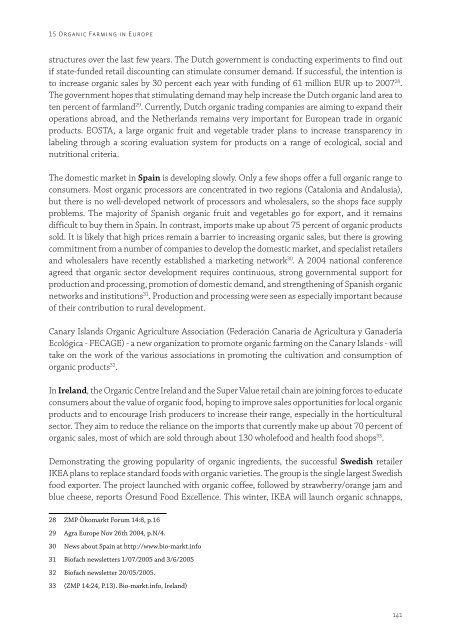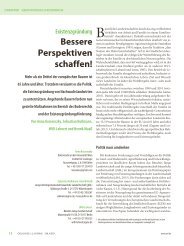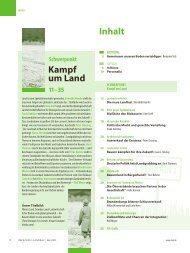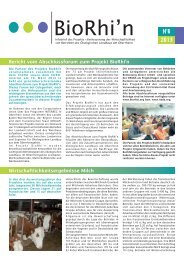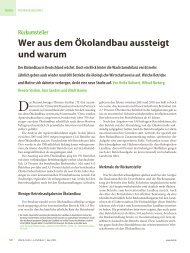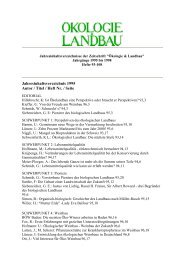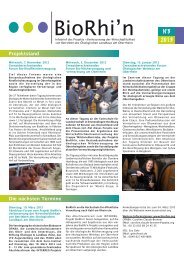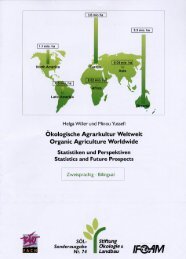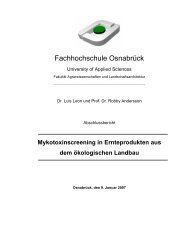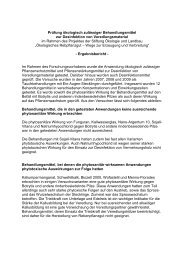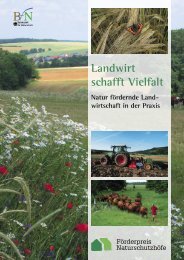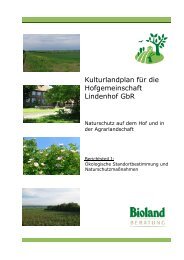the world of organic agriculture - Organic Eprints
the world of organic agriculture - Organic Eprints
the world of organic agriculture - Organic Eprints
Create successful ePaper yourself
Turn your PDF publications into a flip-book with our unique Google optimized e-Paper software.
15 <strong>Organic</strong> Farming in Europe<br />
structures over <strong>the</strong> last few years. The Dutch government is conducting experiments to find out<br />
if state-funded retail discounting can stimulate consumer demand. If successful, <strong>the</strong> intention is<br />
to increase <strong>organic</strong> sales by 30 percent each year with funding <strong>of</strong> 61 million EUR up to 2007 28 .<br />
The government hopes that stimulating demand may help increase <strong>the</strong> Dutch <strong>organic</strong> land area to<br />
ten percent <strong>of</strong> farmland 29 . Currently, Dutch <strong>organic</strong> trading companies are aiming to expand <strong>the</strong>ir<br />
operations abroad, and <strong>the</strong> Ne<strong>the</strong>rlands remains very important for European trade in <strong>organic</strong><br />
products. EOSTA, a large <strong>organic</strong> fruit and vegetable trader plans to increase transparency in<br />
labeling through a scoring evaluation system for products on a range <strong>of</strong> ecological, social and<br />
nutritional criteria.<br />
The domestic market in Spain is developing slowly. Only a few shops <strong>of</strong>fer a full <strong>organic</strong> range to<br />
consumers. Most <strong>organic</strong> processors are concentrated in two regions (Catalonia and Andalusia),<br />
but <strong>the</strong>re is no well-developed network <strong>of</strong> processors and wholesalers, so <strong>the</strong> shops face supply<br />
problems. The majority <strong>of</strong> Spanish <strong>organic</strong> fruit and vegetables go for export, and it remains<br />
difficult to buy <strong>the</strong>m in Spain. In contrast, imports make up about 75 percent <strong>of</strong> <strong>organic</strong> products<br />
sold. It is likely that high prices remain a barrier to increasing <strong>organic</strong> sales, but <strong>the</strong>re is growing<br />
commitment from a number <strong>of</strong> companies to develop <strong>the</strong> domestic market, and specialist retailers<br />
and wholesalers have recently established a marketing network 30 . A 2004 national conference<br />
agreed that <strong>organic</strong> sector development requires continuous, strong governmental support for<br />
production and processing, promotion <strong>of</strong> domestic demand, and streng<strong>the</strong>ning <strong>of</strong> Spanish <strong>organic</strong><br />
networks and institutions 31 . Production and processing were seen as especially important because<br />
<strong>of</strong> <strong>the</strong>ir contribution to rural development.<br />
Canary Islands <strong>Organic</strong> Agriculture Association (Federación Canaria de Agricultura y Ganadería<br />
Ecológica - FECAGE) - a new organization to promote <strong>organic</strong> farming on <strong>the</strong> Canary Islands - will<br />
take on <strong>the</strong> work <strong>of</strong> <strong>the</strong> various associations in promoting <strong>the</strong> cultivation and consumption <strong>of</strong><br />
<strong>organic</strong> products 32 .<br />
In Ireland, <strong>the</strong> <strong>Organic</strong> Centre Ireland and <strong>the</strong> Super Value retail chain are joining forces to educate<br />
consumers about <strong>the</strong> value <strong>of</strong> <strong>organic</strong> food, hoping to improve sales opportunities for local <strong>organic</strong><br />
products and to encourage Irish producers to increase <strong>the</strong>ir range, especially in <strong>the</strong> horticultural<br />
sector. They aim to reduce <strong>the</strong> reliance on <strong>the</strong> imports that currently make up about 70 percent <strong>of</strong><br />
<strong>organic</strong> sales, most <strong>of</strong> which are sold through about 130 wholefood and health food shops 33 .<br />
Demonstrating <strong>the</strong> growing popularity <strong>of</strong> <strong>organic</strong> ingredients, <strong>the</strong> successful Swedish retailer<br />
IKEA plans to replace standard foods with <strong>organic</strong> varieties. The group is <strong>the</strong> single largest Swedish<br />
food exporter. The project launched with <strong>organic</strong> c<strong>of</strong>fee, followed by strawberry/orange jam and<br />
blue cheese, reports Öresund Food Excellence. This winter, IKEA will launch <strong>organic</strong> schnapps,<br />
28 ZMP Ökomarkt Forum 14:8, p.16<br />
29 Agra Europe Nov 26th 2004, p.N/4.<br />
30 News about Spain at http://www.bio-markt.info<br />
31 Bi<strong>of</strong>ach newsletters 1/07/2005 and 3/6/2005<br />
32 Bi<strong>of</strong>ach newsletter 20/05/2005.<br />
33 (ZMP 14:24, P.13). Bio-markt.info, Ireland)<br />
141


